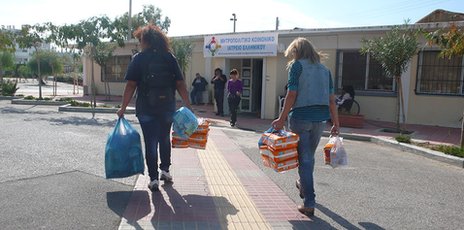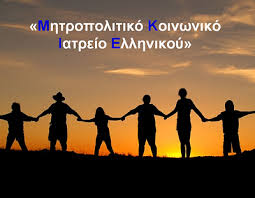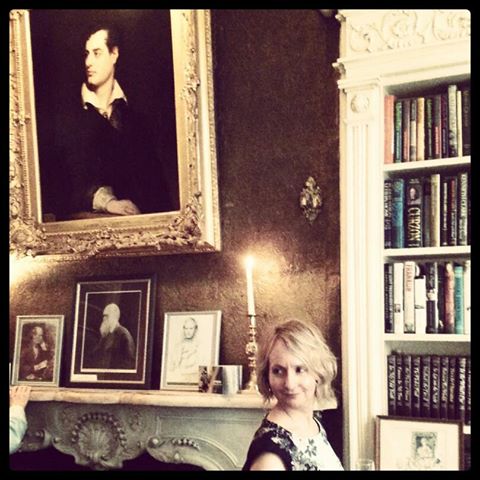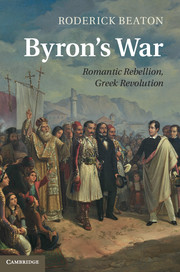Hope in Greece
“People are getting INVOLVED — Folks are DOING something, and that is a magical thing to watch, and even more magical to be involved in,” my dear friend Martha wrote to me this spring from Athens.
The news of Greece, as you know, hasn’t been good. Austerity strategies are a cruel joke, based on false premises. Homelessness, drug addiction, prostitution are on the rise in Athens, as you can see captured in Angelos Tzortzinis’s heartbreaking photos.
Maybe this is all you’ve heard about Greece—one wave after another of failed bailouts and government infighting. Maybe you’ve tuned out, writing it off as a hopeless cause. Beautiful country, great weather, hopeless politics, nothing to be done. Maybe, then, you need to learn about a remarkable crisis response in Athens: the Metropolitan
Community Clinic at Helliniko, a free clinic that has sprung up to help the unemployed, uninsured, and/or impoverished Greeks, immigrants, and others who are falling through the widening cracks in the system.
Community Clinic at Helliniko, a free clinic that has sprung up to help the unemployed, uninsured, and/or impoverished Greeks, immigrants, and others who are falling through the widening cracks in the system.
(The space, may I add, is an inspired repurposing of a former American Air Force base.)
The clinic’s been catching some much-deserved media attention: this BBC News Magazine story, a visit from Naomi Klein (scroll down to 29 May 2013). But I know about it from Martha and her husband Mark, who have been volunteering there since its inception (read her quoted in the BBC story). Not the type of folks who sit soliloquizing while something is rotten in the state, they have been translating materials for the clinic’s website, sorting medicines for the storeroom, listening to patients’ stories, chipping in to pay for medicines to keep people going, providing good will and hope.
An authentic hope, as my colleague Jack Nelson-Pallmeyer puts it—one which “pays attention to problems as they actually are to the best of our understanding, even if problems are grave and solutions are demanding or uncertain.” Not the feeble wishful thinking, the “optimism disconnected from reality” that passes for hope in most of our public discourse (and private conversations, for that matter).
Outside of Greece we’re always reading about the high unemployment rate, especially for young people, who are depicted as futureless. In contrast, Martha sees their vibrant creativity at work: “The young people will save us. There are so many new ideas, initiatives – young folks coming up with wonderful things – ranging from apps that can be used by free clinics to track medications to fun ads for Greek tourism. Wonderful stuff.”
One of my writing idols Rebecca Solnit profiles the ways communities can rise up in crisis situations: the generosity that individuals show to one another, the calm they find together at the center of the storm. Instead of complaining about how the situation will never be ideal, we could be heroes building on hope, knowing that “to be hopeful means to be uncertain about the future, to be tender toward possibilities, to be dedicated to change all the way down to the bottom of your heart.”
In 1822 Byron wrote to his friend and banker Douglas Kinnaird, “the longer I live – the more I perceive that Money (honestly come by) is the Philosopher’s Stone. . . . I want to get a sum together to go amongst the Greeks or Americans [he meant South Americans] – and do some good.” He did just that: got a sum together and spent the last 100 days of his life trying to do some good in Greece.
I’ve recently returned from the International Byron Conference at King’s College London.
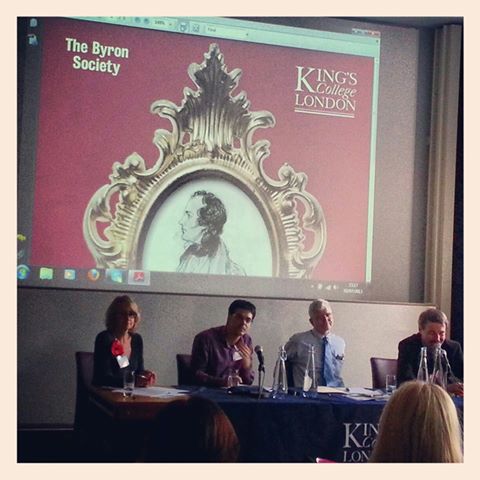
http://www.kcl.ac.uk/artshums/depts/chs/events/Byron-Conference/index.aspx
International Byron Conference, King’s College London
International Byron Conference, King’s College London
The conference theme was the politics of poetry (and poetry of politics), highlighted by a keynote address by Professor Roderick Beaton, whose new book Byron’s War narrates the trajectory of Byron’s life that led him from romantic young traveler and Romantic poet to statesman working for the Greek cause.
Much of what Byron faced in 1824 he would in 2013: petty bickering and mutual undermining between factions who should be working together for a common solution, economically-interested meddling from European leaders who wanted their own piece of Greece, quiet indifference from the many. The venture, then as now, was fraught with uncertainty: are you funding the right people, is your money being used effectively? Will any lasting good come from this? And what precisely do the words “right” and “effectively” and “good” in this situation mean?
It’s easiest to do nothing. But Byron, and Martha and Mark, and countless unsung volunteers, put their philosophers’ stones to good use and sprang into action. Byron’s death in Greece galvanized a movement, and a mythology. Martha is more sanguine: “we will survive and will come out of this different, utterly changed, and pretty much the same.”
P.S. by
Martha and Mark:
Mr. Byron,
you must have been surprised at hearing your name mentioned in the same
sentence with ours – instead of the usual Romantic poets. We were surprised ourselves, because Niko, Eleni,
Christo, Lefteris and so many other hard working volunteers weren’t mentioned
either. No room you see – there are more
than 200 of us. And the doctors! No doctors, no clinic. Ninety doctors and therapists – no room for
their names either. Amy is a scholar and
knowledgeable about Greece ; she
has been visiting Greece
